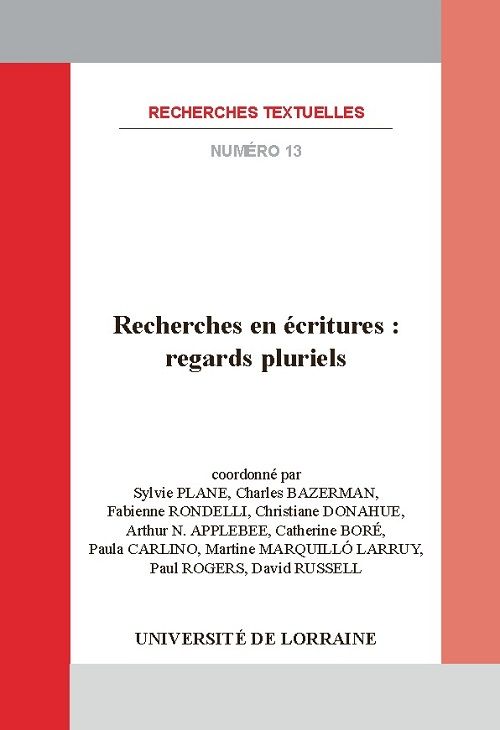Recherches en écritures : regards pluriels

En février 2014, la troisième édition du congrès Writing Research Across Borders a rassemblé à Paris près de 1200 chercheurs venus de 60 pays, offrant ainsi un vaste aperçu de l’actualité des recherches en écriture, « au-delà des frontières ». Frontières nationales certes, mais aussi frontières d’ordre épistémologique, parce que l’écriture est un objet complexe résistant aux entreprises holistiques. Et frontières linguistiques car les recherches sur l’écriture n’ont pas exactement les mêmes accentuations selon qu’elles proviennent d’une sphère intellectuelle qui a pour langue de travail l’anglais ou le français, d’où le choix de faire figurer dans ce recueil les articles dans leur langue originale.
Les deux premières sections de l’ouvrage regroupent des articles s’intéressant à l’activité d’écriture, d’une part dans le cadre de la scolarité obligatoire, d’autre part à l’université et dans le monde professionnel.
La troisième section regroupe des articles questionnant les dimensions cognitive et linguistique de l’écriture.
Ainsi, à travers les articles rassemblés dans cet ouvrage, se dessine un paysage de la recherche actuelle en écriture, qui témoigne de la manière dont progresse notre connaissance de l’écriture et de son apprentissage.
In February 2014, nearly 1,200 researchers from 60 countries took part in the Third Writing Research Across Borders Conference, which presented a “crossborder” panorama of recent happenings in research in writing.
These borders were not only geographical borders, but epistemological ones as well, since writing is a complex matter that resists being considered as a whole. The borders are also linguistic, since research into writing is notemphasized in the same way, according to whether the language for the intellectual sphere is English or French. This is why the articles in this review have been published in the language in which they were originally written.
The first two Sections concern articles about the activity of writing, in compulsory schooling on the one hand; and in the Academic and Professional worlds in the other hand.
The third Section concerns articles which deal with the cognitive and linguistic dimensions of writing.
A panorama of present-day research in writing is presented through the articles in this book – as a witness to the manner in which our knowledge of writing and learning how to write is progressing.
Sommaire
Remerciements/Thanks
Présentation
Sylvie Plane
Enseigner l’écriture, comprendre ses fonctionnements et ses évolutions, au delà des frontières
I. L’écriture de l’école au lycée/Writing by Primary and Secondary Students
Arthur N. Applebee
What shapes school writing? Examining influences on school writing tasks over time in U.S. secondary schools
Claudine Garcia-Debanc & Myriam Bras
Vers une cartographie des compétences de cohérence et de cohésion textuelle dans une tâche-problème de production écrite réalisée par des élèves de 9 à 12 ans : indicateurs des maîtrise et progressivité
Dolores Amira Dávalos Esparza
The incidence of speech modalisers on children’s reflections about the use of expressive punctuation
Nathalie Chapleau
Rééducation de l’orthographe lexicale auprès du scripteur présentant une dysorthographie
Eduardo Calil
Writing, memory and association: newly literate students and their poetry creation processes
Bruno Hubert
Écrire pour donner à voir et entendre sa compréhension du monde
Cristina M. Aliagas
Schooled literacy in teenagers’ online writing
Roxane Joannidès & Marie-Claude Penloup
La littéracie numérique et l’orthographe dans les écrits adolescents : des contacts conflictuels entre variétés de l’écrit ?
Maria Lim Falk & Per Holmberg
Paths to academic writing in a globalized world: A longitudinal study of content and language integrated learning in upper secondary school in Sweden
Angela Kohnen, E. Wendy Saul & Nancy R. Singer
Developing support for teachers and students in secondary science classrooms through writing criteria
Annie Camenisch & Serge Petit
Écrire en mathématiques : le rôle des écrits intermédiaires
II. L’écriture à l’université et dans le monde professionnel/Writing in Higher Education and the Professions
Olga Dysthe, Frøydis Hertzberg, Ellen Krogh & Birgitta Norberg Brorsson
Writing in the content areas a Scandinavian perspective combining macro, meso, and micro levels
Kate Chanock
Learning specialist working with faculty to embed development of academic literacies in discipline subjects
Jacqueline Lafont-Terranova & Maurice Niwese
Faire écrire pour construire des connaissances : accompagner la construction d’une posture d’apprenti-chercheur
Charles Bazerman, Natalia Avila, Ana Valéria Bork, Francini Poliselli-Corrêa, Vera Lúcia Cristovão, Mónica Tapia Ladino & Elizabeth Narváez
Intellectual orientations of studies of higher education writing in Latin America
Agnès Pernet-Liu
Les ancrages culturels de l’écriture des étudiants chinois à l’Université : culture d’apprentissage et traditions académiques
Marie-Hélène Jacques
Écriture et reconstruction identitaire au cours des transitions professionnelles
Mary Lourdes Silva
Commenting with Camtasia: A descriptive study of the affordances and constraints of peer-to-peer screencast feedback
Patricia Richard-Principalli, Georges Ferone & Catherine Delarue-Breton
L’écriture dans les forums de discussion : entre genre premier et genre second
Catherine Muller
Apports du tutorat en ligne pour la production écrite dans un dispositif de télécollaboration
Ivana Mirović & Vesna Bogdanović
Use of metadiscourse in research articles written in L1 and L2 by the same authors
François Mangenot
Écrire avec le web social : quels types de sites pour quels étayages
Carolina Roni & Paula Carlino
Reading to write in sceince classrooms: Teacher’s and students’ joint action
Christina Romain, Véronique Rey & Marie-Emmanuelle Pereira
L’enjeu de la rédaction professionnelle au XXIe siècle : des outils pluridsciplinaires au service d’une écriture de haut niveau
III. Approches cognitives et linguistiques de l’écriture/Cognitive Linguistic Approaches to Writing
Ariel M. Cohen-Goldberg
Informative differences: An argument for a comparative approach to written, spoken and signed language research
Markus F. Damian & Qingqing Qu
Syllables as representational units in English handwritten production?
Bernard Combettes & Annie Kuyumcuyan
Ajout après le point et hiérarchisation de l’énoncé : une tendance de l’écriture contemporaine
Maarit Mutta
Pausal behavior in the writing processes of foreign and native language writers: the importance of defining the individual pause length
Louis Hay
La critique génétique, une autre approche de l’écriture ?
Olga Anokhina
Multilingual writers and metalinguistic awareness: Can we use manuscripts as a basis for a typology of scriptural practices?
Biographies des auteurs/Authors’ biographies




